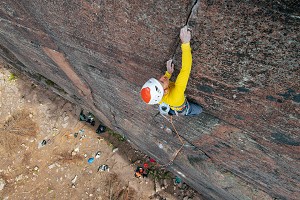

After I wrote the article 'Mountaineering Mums' last year, a lot of mountaineering dads contacted me suggesting it was only fair to write a follow up exploring their side of the story. At first it was easy. Tales of terrible parenting, conflicting strong opinions and controversial generalisations piled in. Excellent! However, when I looked for mountain literature, articles and research to give some background and reveal how mountain dads have developed from previous generations, things became more tricky.
Unlike the mums mountaineering men have hardly ever made the press for being fathers. You can see what Summers means in the above quote by reading this obituary of Paul Nunn (written for the Independent by Doug Scott). Following her death on K2, Hargreaves was scrutinised and heavily criticised in the international press because she was a mother who risked her life. Meanwhile, this glowing obituary of Paul Nunn, who did the same as a father a few days earlier, merely mentions his children in brackets at the end.
What's more, most of the relevant books, articles and theses I found dwelled mainly on climbing mums. And while some women (such as Gwen Moffat the first ever female British guide - read her fascinating autobiography 'Space Below My Feet' online) have written very openly about the conflict of being a mountain-loving parent, mountaineering men have kept very quiet on the topic, so far.
In the PHD thesis I quoted in the opener, 'Unequal genders: mothers and fathers on mountains', Summers writes that Andy Kirkpatrick is one of the rare mountaineering fathers willing to speak publicly about feelings and family, and contrasts him with Chris Bonington. So I started here:
“Kirkpatrick's writings in general tell of the heartsickness he experiences being away from his family. Faced with the same dilemma in his early years Chris Bonnington, a British climber and writer, never stopped climbing, despite his young family and the strain it put on his wife by his being away for long periods. His writings rarely relay any insights into his family life but in interviews he has been more candid.” (Summers)
Maria Coffey interviews both fathers in her book 'Where the Mountain Casts its Shadow', and both speak candidly about how climbing has affected their relationship with their children and vice versa. The short version is:
When there is competition between my kids and climbing, I shall stop.
Andy Kirkpatrick
But we're better parents because we're doing things that fulfil us.
Chris Bonington
The two parenting attitudes reveal different personalities. Arguably however, the difference is also partly because Bonington is a generation older than Kirkpatrick. After all, it would only be possible for a mountaineering dad to prioritise climbing over children if the mother took on the lion's share of the child rearing. The modern dad is expected to be more involved in parenting than ever before.
The blurring roles of mum and dad
Even if they weren't away climbing for months at a time, why did past generations of dads automatically get the biggest share of child-free leisure time outside the home? It was mainly about social expectation and accepted gender roles. In her book, 'Everyday Masculinities and Extreme Sport' Robinson talks of generations of women who “put their husband's interests and pursuits above their own.” Shirley Conran's bestselling 'Superwoman' book of the 1970s, described by the Guardian as a 'historic volume', encouraged women to think more about their own interests, and highlighted a shift in thinking: "Byron might well have written 'Housework is of a man's life a thing apart, 'tis woman's whole existence'" (Conran).
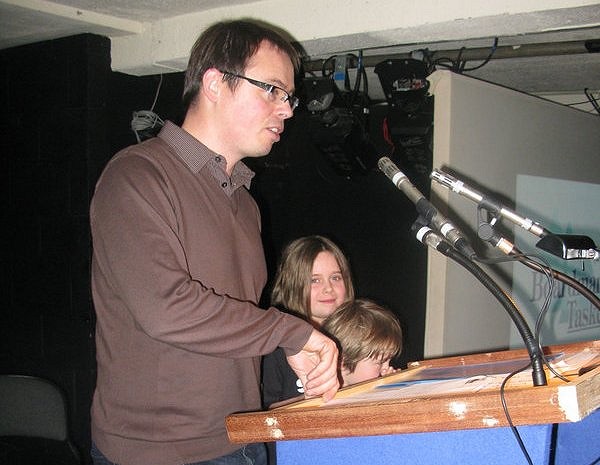
It was fifteen years ago when Alison Hargreaves died on K2, and the press largely portrayed her as self-centred, commercially driven and putting herself before her kids (if you don't remember, read this Guardian newspaper interview with her husband). Many people considered it unacceptable for a mother to put her life on the line for the mountains, even though fathers have rarely been criticised - or even noticed - for doing the same throughout the whole history of mountaineering. One journalist even wrote, “What is interesting about Alison Hargreaves is that she behaved like a man” (Rose/Douglas).
Would Hargreaves have faced the same heavily gendered criticism if she had died in 2010? Will mountaineering fathers face more criticism in the future? Climbing isn't a male-dominated world anymore, and child-rearing isn't a women-dominated one either. As gender roles increasingly blur, it's certainly an interesting time to explore the world of the modern mountaineer/climber dad.
Who holds the baby?
Matt Heason, Cliffhanger and Sheffield Adventure Film Festival organiser and a climbing dad, says that even in these modern times most mums get out climbing a lot less than dads, but through their own choice: “Is there a difference between climbing mums and dads? I'd love to be able to say no, but it seems there is...
Why? - After reading my article 'Mountaineering Mums', one mum commented that sometimes she has been too tired to drive home after climbing trips, so has had to get her daughter's father or her own father to do the school run the next day (you can read this and other forum comments about the article here). “The guilt is something awful!” she wrote. “You feel totally irresponsible and a bad mother, but often I think it's in a woman's nature to feel guilt about such things.”
Is it particularly 'in a woman's nature to feel guilt about such things?' Another UKC reader pointed out that some feminist philosophers believe men have equally strong desires to care for their children (i.e. what we would call a maternal instinct), but that society has traditionally taught fathers that it isn't acceptable to show it.
One very modern climbing dad told me that seven months after his child was born, his wife returned to a job she enjoyed and he became the primary carer. Sounding very much like a traditional mum he said: “I just didn't have any time to climb, but I didn't think I was missing anything. I suppose I bonded more with our child as a result of spending so much time with him. I never did go back to spending so much time training or climbing outdoors. With a wife who was working full time that just didn't seem right.”
It's interesting to see how modern climbing parents are testing the ground to make climbing family life work, in individual ways that suit their particular family. Climber Jo Horne is still as keen as her partner, but told me that they don't climb together as husband and wife any more: “It's an unsaid reason – if anything does happen, at least one will be here to raise James.” Other climbing parents compromise by spending climbing holidays in family-friendly places like Font or Mallorca.
Meanwhile, I have a couple of friends who bring their baby along on climbing and camping trips. They tie a sling round the bottom of the tiniest sleeping bag they could find so she can't slip down in it, and tuck her in a big rucksack at the crag if she needs a nap. Bernie does say it's like mobilising an army to prepare for a weekend's climbing with a baby in tow, but it means neither parent has to stay home feeling left out.
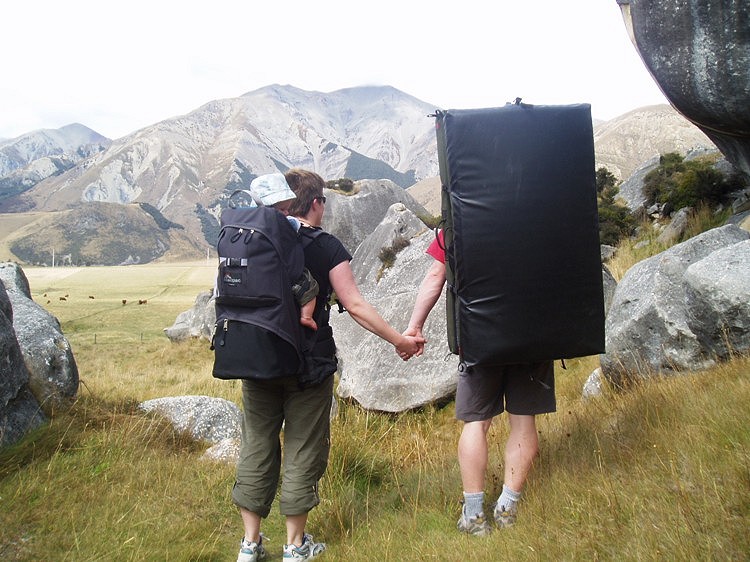
It's understandably harder for mums to get back into climbing than dads, though. Most women can't help losing a bit of muscle and perhaps psyche for climbing as a consequence of pregnancy. On the other hand, perhaps it's understandable if a man finds it harder to adjust to being a parent - after all, women have had nine months of physically adjusting to the baby's needs and lowering their level of physical activity.
Is it harder for climbing dads to adjust to parenting than mums?
This quote from a climbing dad is heavy with responsibility. Seeming to notice this negativity, he then tempers his words with 'don't get me wrong' and 'given every blessing':
“There is always so much to do with a young child around, and someone has to do it. If a child's going to feel secure, you don't want extra tensions around. And that's what you'll get if someone isn't pulling their weight or isn't fully engaged with the changing needs of the developing child. Don't get me wrong, I've enjoyed great adventures in Scotland and in far wilder places and I've been given every blessing to go off and do my thing from time to time.”
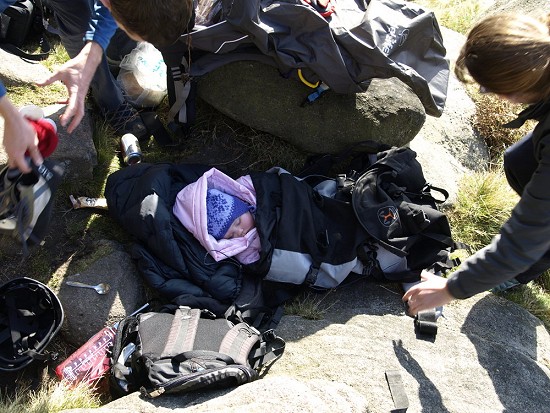
According to Robinson, by the time they have kids and settle down, nowadays most climbing men have developed “self-awareness to recognise the selfishness inherent in seriously pursuing climbing”. Often through bitter experience in relationships! Some of the fathers she interviewed looked down on 'Peter Pan' dads who didn't tone down their climbing once they had kids. One former elite climber commented:
That doesn't mean modern climbing dads find the adjustment easy, though. The same man made comments throughout the interview about his weight gain, lack of former fitness and occasional desire for the excitement of youthful climbing exploits.
To balance being a good dad, good husband and fulfilled climber, alpinist and photographer Ian Parnell has changed the way he works dramatically: fewer photo shoots away, rarely soloing, backing off routes earlier and not going on Himalayan expeditions.
Ian doesn't view this change negatively, though, but comments philosophically that he hopes each part of his life will enhance the other. For example his baby daughter exploring her world has inspired and re-energised him: “I love the way she is constantly on the look out for new experiences, exploring and learning. It's given me new eyes when I head out.”
Nowadays many men consider climbing less and spending more time on family relationships a natural part of ageing. However some super-keen mountaineering men find a constant parental role of domestic routine unnatural and restricting. Usually it's not about rebelling against modern ideas of parenting. It's just about who they are, what sort of lifestyle suits them and where they feel at home. Should these kind of men make a choice between climbing and having kids?
I met John Falkiner, mountain guide, former James Bond stunt double and father in the Haute-Savoie region of France last summer. He finds it difficult to spend time with his kids as his guiding work takes him around the globe on long trips. John told me: “Some women are attracted to free-spirited mountain men. But when these women want to settle down and have security and a family ... that can be when it falls apart.”
Understandably, many climbing dads aren't keen to talk on the record about relationship conflicts and sub par parenting.
I spoke to several anonymous mountaineers who had had bad experiences, or knew others who had, and often the reason for the relationship breakdown fell into two categories. The dad was obsessed with mountains, or the dad's job was the mountains ... with some overlap.
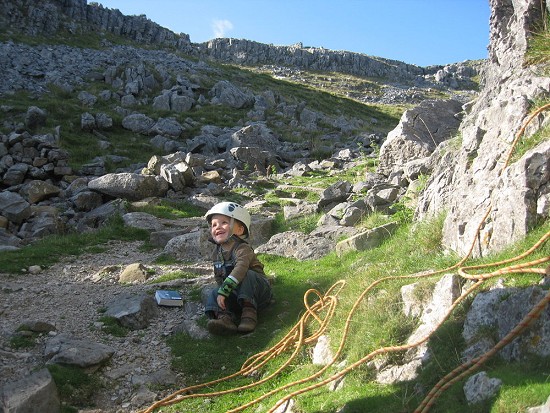
Mountain guides and instructors often HAVE to spend long periods of time away – for example Plas y Brenin guides spend time away in Scotland during the winter and during the summer in the Alps. Of course sometimes it's the other way around, and the wife is the mountain guide or, like Rick and Isabelle Santoire, both are mountain guides. It's still rare though, although more and more women are becoming qualified.
Before kids come along, a keen mountaineer can make a great mate to enjoy an adventurous and active lifestyle with. But once children are born, this can translate into a less romantic image of a mother home alone, under an increased burden of responsibility.
Time away isn't the only issue. Conflicts sometimes develop when a mountaineering dad wants to move to the Alps or other climbing area, while the wife is happy where she is with the support of the local social/family network. Some mountaineering dads spoke of situations where they were increasingly emotionally leant on by their partner to give up their passion and healthy pay packet - and so resentments developed on both sides.
When I was in Saint Gervais this winter, mountain guide Jonny Baird told me he's watched several mountain guide girlfriends/wives try to change their men and make them domesticated. Some of these women had moved to somewhere like Chamonix to be with their partner, but had then found themselves often alone. Sometimes, understandably, Hell hath no fury like a woman scorned for the mountains.
Of course, there can be other reasons besides climbing that fathers spend long periods of time away from their kids (eg. separation) and, as American climbing rapper Odub points out (Click to read UKC article about Odub), it's not all bad: “It's increasingly easier to see my influence on her [his daughter], and I believe our limited time has raised the quality of those influences. To put it simply, I pay more attention to her than most parents I observe.”
And many dads do work hard find the right balance so that they can keep both their relationship with the mountains and their relationship with their kids - spending high quality time when they return, or favouring day or short courses. Mountain guide Twid Turner told me: “That's my life: how you balance time away! Some kids never see their parents as they are down the pub all the time. We spend all our time with our child when we are in the valley. I talk to my daughter every day. But time away is an issue.”
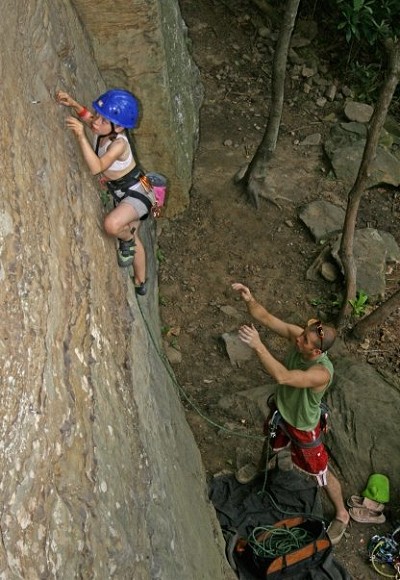
Death - is it worth the risk?
Another issue top-end mountain dads face is balancing the risk. Jonny Baird told me that he is the only mountain guide he knows who hasn't been avalanched, at least once.
But Odub gave the common argument: “Anything you do can result in your death. Life itself results in death. I'm positive that my daughter would find solace in the fact that I died while following my heart as opposed to getting hit by a truck while jogging.”
Perhaps it's true of Odub's daughter, who is herself a keen climber. However, having grown up without her father around, John Harlin's daughter feels angry (cited in Coffey):
As Matt Heason succinctly puts it: “Dying whilst doing something you enjoy is a nice sentiment, but incredibly selfish if used as a justification for doing something that results in your death.”
Some fathers, like this one cited in Robinson, use their position as breadwinner to legitimise a desire to travel to far flung places and enjoy risky adventures: “Julia, I have to go. It's my work – it's what I do so we can all live here in this house.” However, Alison Hargreaves was accused by the press of being commercially driven and putting climbing before her motherly duties – implying she should have been a mother first and a professional mountaineer second.
The future – is your life ever your own again?
One UKClimbing reader said that for years he has craved adventure: “Climbers calculate risk. He is a teenager now, when my son no longer needs me, when he is a man, I will risk more.”
To dads of youngsters, UKClimbing and Rockfax director Alan James says it does get easier to climb more when your kids get older, because when they are very young then there are all sorts of pressures on both parents which tends to make climbing take a back seat, and regular weekend climbing and training is difficult to combine with a very young family. However, Alan has found that as his kids have grown older, they have actually rejuvenated his appetite for climbing, and pointed him in different directions: “One of the best days I had last year was doing mountain VDiffs in Wales with Sam (12). I would never have dreamed of doing these routes in my intense climbing years in the 90s, it would have been a day wasted on easy stuff.”
The idea of a family bond strengthened by climbing appealed to many climbing dads. Matt Heason hoped for a family life like that of the Whittakers when their kids were older – Jill and Paul Whittaker regularly climb with their kids even now that Katie and Peter are in their late teens.
Another dad wondered what would happen if his son didn't like climbing when he grew up, but was philosophical:
It's not for you to decide, 'you're going to be this or that.
I don't think society should dictate a climbing parent, or any parent, ought to be this or that either. It seems to me parents have to find a compromise that works for everyone in their family, and ignore any criticism from others who did things differently, because what works varies considerably. No two kids are the same, and no two parents are either, so there can be no single perfect way to bring up a family.
However, I guess you have to bear in mind before you have a child that, just as you don't know whether they'll enjoy climbing or prefer another sport, you also don't know whether they'll hate you leaving them behind to go climbing at the weekend or on holidays, or be independent-spirited and not mind your need to have a big part of your life that doesn't involve him or her. Maybe they won't understand your desire to climb until they are older.
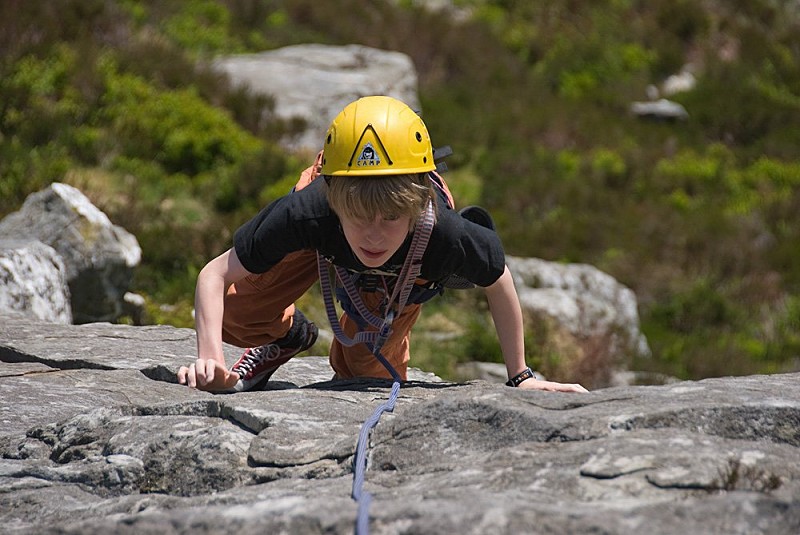
Dan Bonington was a rebellious child who wanted his dad to be home and be normal. But when he was older and his dad took him to Kilimanjaro, his perspective changed at last: "The beauty, the sense of the vastness of nature, it was awesome. It was like the power of the mountain exploded up through me ... Suddenly I realized what had been driving Dad all those years. And for the first time, I wasn't bitter about what I'd been through when I was growing up..."
Personally I agree with Ian Parnell: “There are fathers who go away on big expeditions who are still great dads and then there are mountaineers who give up the hills but also give up some of their love for life. I think parenting is a constant balancing act, with both parents having to be flexible.”
Some further reading
- 'Regions of the Heart', Rose/Douglas biography of Alison Hargreaves
- 'Going Manless', Molly Loomis
- 'Everyday Masculinities and Extreme Sport' Victoria Robinson
- 'Where the Mountain Casts its Shadow' Maria Coffey
- 'Unequal Genders: Mothers and Fathers on Mountains' Kaydee Summers
- 'Rock Climbing is a Masculine Sport? Understanding the complex gendered subculture of rock climbing' Katharine R. Plate
- Gwen Moffat 'Space Below My Feet'
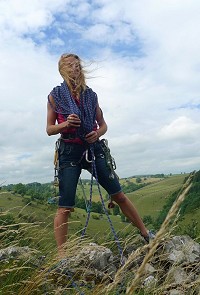
About Sarah Stirling
As well as being Assistant Editor of UKClimbing, I regularly contribute to British outdoor, adventure and travel magazines. I studied English Literature and Language at university and graduated with first-class honours. Big thanks to all the dads, anonymous or otherwise, who spoke to me about their experiences.
- Therm-a-Rest Navis Sleeping Bag 7 Jul, 2013
- Scarpa Gea RS Ski Touring Boots 28 Apr, 2013
- Polvere Ski Mountaineering Skis 23 Apr, 2013
- Rab Infinity Down Jacket 7 Apr, 2013
- COMPARISON REVIEW: Mountain Hard Shells 4 Apr, 2013
- The Questionable Ethics Of Down Production 10 Jan, 2013
- WITH VIDEO: NEW TNF Summit Series Meru Range 12 Sep, 2012
- Autumn/Winter 2012 Polartec NeoShell Mountain Clothing 7 Sep, 2012
- The Trust: Ueli Steck and Scarpa Interview 21 Aug, 2012
- Patagonia Ultralight Down Jacket 5 Jul, 2012

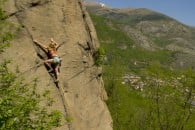

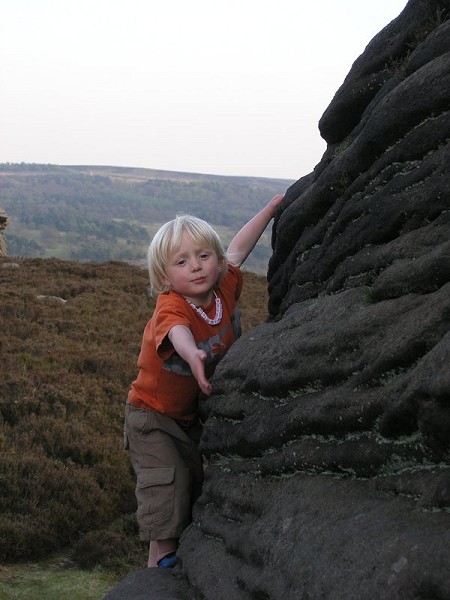
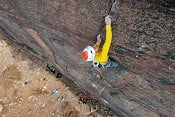
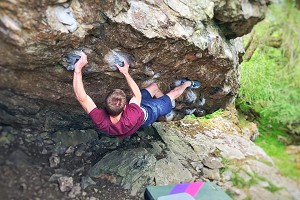
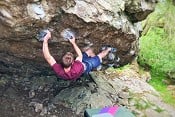
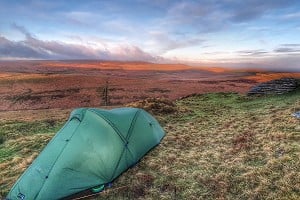





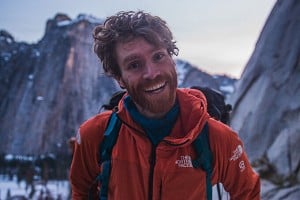



Comments